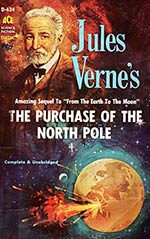
![]() gallyangel
gallyangel
12/31/2017
![]()
I think I have to divorce my reading of this novel into two different camps. The first camp is to try and approach this novel from the P.O.V. of a Verne reader in 1889 (which was the first english translation). In Other words, I need to try and forget all the science and knowledge accumulated since that date. The second camp is how I see the novel from the here and now (12/30/17).
The gun-club of Baltimore is at it again. From The Earth To the Moon, and A trip Round The Moon, now it's time to work upon the Earth itself. They buy the north pole so they can get at all that coal, and uninhabited land. All they need to do then is retilt the Earth so it's standing straight on perpendicular to the solar system. That will melt the poles, eliminate seasons, cool the tropics. It's be paradise!
I think from a turn of the last century perspective the idea is interesting if completely fantastical. Verne does a bit of window dressing with mathematics and physics. The plot takes us to Kilimanjaro in Africa, so back to the mysterious continent. Verne has two main characters and everybody else is mostly cardboard cuts outs. Barely there. The idea that human hubris, a mistake in calculations by a human calculator, who prides himself on his error-free calculations, seems most fitting as the foil to the plot. The gun-club has failed due to a few zeros, orders of magnitude. I got the sense that Verne had his character shrug it off as nothing, and it was then on to the next thing, which fortunately/unfortunately never happened.
From the P.O.V. of the 21 century.
You've got to be s***ing me. This is one of the most heinous ideas ever, turn the Earth on its axis? Do you have an idea what kind of damage that would do?
Verne address this issue. It's like a nuisance for some. It'll wipe out most of China and Japan, and a few other places. But since this is the gun-club of Baltimore, Americans, then what do they care? They don't.
Verne assessment of the damage is underplayed, by orders of magnitude.
Since Climate science didn't yet exist, he has no idea that it would take hundreds of years, at the fastest, for the climate to settle down, if such a thing happened. He has no idea that there is no land under the north pole, nor coal. He doesn't address the monumental flooding that would result from the melting of both polar caps. (Verne doesn't even seem cognizant that if you melt one cap you automatically melt the other.) The floods, the earthquakes, the wind storms. All underplayed. What he was proposing was a class A extinction event. And human hubris, the hubris of science - rooted in mathematics, was the agent that foiled the plot. That part is very nice.
Just because you think you can do a thing, doesn't mean you should do a thing. The fact that these yahoo americans disregarded all fear, all reason, all logic, all emotion in pursuit of this course for coal, Coal!, does show the stupidity that smart men can fall prey to: I know best and I won't listen to anyone else.
It's not a wonder that this novel of Verne's is relatively unknown. It's shallowly written, has a hideous plot, and it's only saving grace is the mathematical error which saves the world. The total disregard for the world, those American had. Ugh! They were going to do this thing for the flimsiest of reasons, profit, and nothing was going to stop them. Again, Ugh! It's so bad such people still exist. Perhaps, by showing off this very devastating trait, it might make it easier for other to see it at work in our own world. Other than that, I think this one is best left undisturbed in its repose.